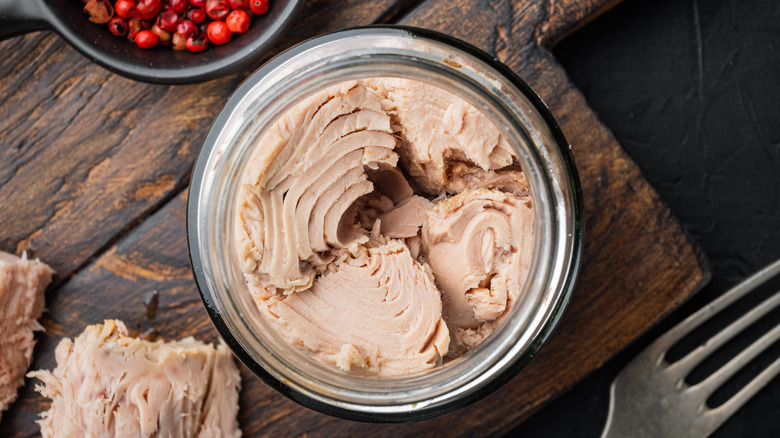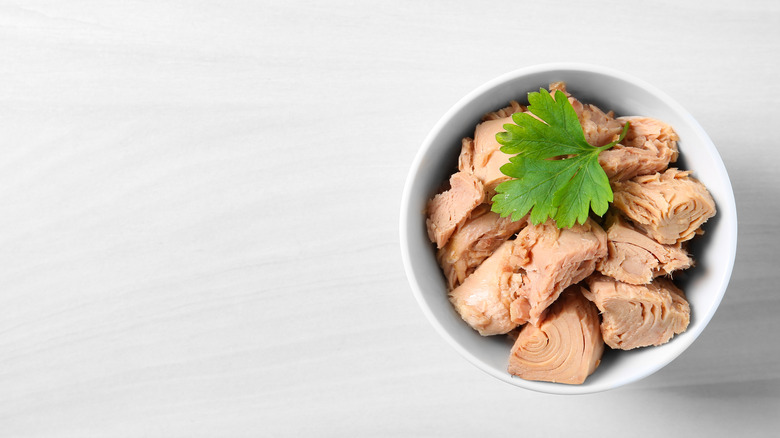Why You Might Feel Bloated After Eating Canned Tuna
Literary iconoclast icon Richard Brautigan might have penned the opus, "Trout Fishing in America," but today, it looks like most Americans are fishing for tuna, instead. According to The National Fisheries Institute, canned tuna was the third-largest type of seafood U.S. consumers picked in 2020 — a 40% popularity increase from 2019. With the cost-effectiveness and versatility of lunch favorites like tuna salad (less than $1 per can at retailers like Walmart), it comes as no surprise.
Tuna isn't just wallet-friendly, either. Just one can of oil-packed tuna contains 14% of the daily recommended intake of omega-3 fatty acids, reports Livestrong. These help promote heart health, lower inflammation, and reduce risk of cardiovascular disease. Canned tuna is also a significant source of protein. In addition to providing the hemoglobin that carries oxygen through the blood, protein promotes bone health and helps prevent heart disease, diabetes, and cancer, reports Harvard University T.H. Chan School of Public Health. A single 5 ounce can of Starkist Chunk Light Tuna in Water packs 20 grams of protein, 37% of the daily recommended intake (per Starkist). Plus, canned tuna boasts even more health benefits when paired with a medley of chopped vegetables in tuna noodle casserole.
Despite these nutritional benefits, another major ingredient in all canned tuna, per Eat This, Not That, is sodium. According to The Linus Pauling Institute, a 4-ounce can of tuna contains nearly ¼ of the daily recommended sodium intake, via SFGate. Here's why it makes a difference.
Don't be salty, but...
The American Heart Association recommends a daily intake of 1,500 milligrams of sodium or less. Yet the average U.S. consumer intakes roughly 3,400 milligrams every day. Whether that tuna is packed in water or in oil can make a big difference in its nutritional value. According to Healthline, 1 ounce of oil-packed tuna contains 118 mg of sodium, versus 70 mg in water-packed tuna.
According to the U.S. Centers for Disease Control and Prevention (CDC), too much sodium can cause high blood pressure, which increases a person's risk of heart attacks and strokes. Around 90% of the sodium in most people's diets, comes from salt and 90% of U.S. consumers over the age of 2 years are getting too much of it. Yet, Sharon Perkins, RN, explains that the human body also needs salt to survive. A salty snack might make you thirsty, but salt performs the essential function of balancing fluids inside and outside the cells, Perkins says, via SFGate.
So salt is still a crucial part of a healthy diet. But why does canned tuna make you feel bloated? The reason, states Medical News Today, is because it causes water retention in the body, which makes you feel puffy and uncomfortable. So, next time you crack open a can of tuna, keep good old salt in mind. A healthy diet is all about balance, pairing your tuna salad with whole wheat bread, carrots, or low-salt crackers is a good way to make it.

